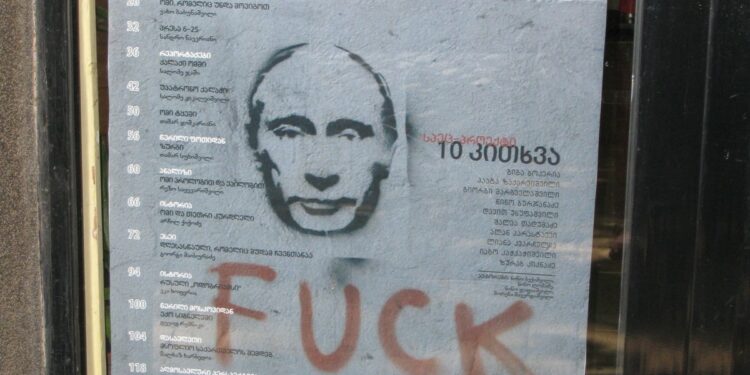The Soviet Union was far from a superpower when the Cold War began. Yes, it had defeated Hitler’s Third Reich and occupied half of Europe. But in 1945, the United States enjoyed superior economic and military strength. Faced with unmatched American power, Stalin chose to pursue a cautious approach instead of direct military confrontation to exert Soviet influence.
In 1946, the Soviets bowed to Western pressure to withdraw their troops from northern Iran after attempting to install two communist-dominated provincial regimes there.
Stalin established the Cominform, or the Communist Information Bureau, to consolidate his conquest of Central and Eastern Europe and diminish the appeal of US postwar reconstruction. It was not until Greece came under pressure from a communist guerrilla movement in 1947 that the words ‘containment’ and ‘Cold War’ entered Western vocabulary.
While Russia today poses a completely different threat from its Soviet predecessor, Vladimir Putin does share similar geopolitical challenges that Stalin confronted immediately after the Second World War. Nato has survived the end of the Soviet threat that it was originally founded to contain and welcomed in states that lie in close proximity to Russia. The combined GDP of Nato’s 32 allies outpaces Russia nearly eight times.
The Russian president has likely made the same strategic calculation as Stalin did that there would be little or nothing to gain from an all-out war with the West. Instead, the Kremlin mobilised sophisticated non-kinetic warfare methods with the aim to push back the US from what it considers to be Russia’s traditional sphere of influence.
This ‘shadow war’ approach can be seen in the recent elections that have taken place across central and eastern Europe.
In Moldova, the European Union was caught off guard as Russia used illicit finance to manipulate the EU candidate country’s democratic process. Moldovan authorities detected that €36m worth of transactions were made from the sanctioned Russian bank Promsvyazbank.
The extremely narrow result in Moldova’s EU referendum will certainly encourage Moscow to pour more funds into electoral corruption. The pro-European government lies increasingly vulnerable to losing its parliamentary majority next year.
The elections in Georgia are a warning of what could potentially happen to Moldova in 2025. Bidzina Ivanishvili has effectively captured Georgia’s state institutions to serve solely Russian interests. Under the oligarch’s Georgian Dream party, the south Caucasus nation introduced a foreign agents law that all but stifled its process of European integration.
Black Sea dominance?
This leaves Russia with a strong position in the Black Sea, which is critical to its claim to be a great power.
The possibility of a Russian foothold in southeastern Europe should be a serious cause for alarm.
It would enable Putin to launch attacks on Ukraine from its southwest and encircle the country thanks to the presence of Russian forces in Belarus. But perhaps what is particularly concerning is the increasing level of influence that Russia enjoys within the EU itself.
Since his full-scale invasion of Ukraine commenced in February 2022, Putin has found useful allies in Hungary and Slovakia.
While both of these EU member states suffered under communist rule, their governments are sympathetic to Russia’s resentment towards a US-led order that threatens the notions of national identity and statehood. Viktor Orbán and Robert Fico have often come into conflict with Brussels for blocking vital EU support for Kyiv’s war effort.
Austria and Bulgaria
A Russia-friendly bloc could well emerge in central Europe with the Freedom Party (FPÖ) securing victory in Austria’s parliamentary elections in September. The leader of the Austrian far-right party, Herbert Kickl, has pleaded for an “understanding” from both Ukraine and Russia and points some of the blame for the war towards the US.
Although the FPÖ has been shut out of power, Moscow may still benefit geopolitically. It is not certain whether Austria’s two main centrist parties will be able to form a coalition government.
Meanwhile, in Bulgaria, Russia has been adept at weaponising the country’s political instability and persistent corruption. The pro-Kremlin party finished third in Bulgaria’s inconclusive elections on Sunday, closely behind the centrist We Continue the Change-Democratic Bulgaria.
Revival’s emergence as a serious political force frustrates the return of effective reform-oriented governance in the Balkan country and weakens EU backing for Ukraine.
Putin has shown that he is prepared to reassert with force what he believes to be Russia’s rightful place in the world. The principal threat is less Russia per se than Moscow’s capabilities to exploit the vulnerabilities that exist within democratic societies and political systems. If Ukraine is to achieve its victory, the West should start to confront this new reality.
Source link : https://euobserver.com/eu-and-the-world/ar03185acf
Author :
Publish date : 2024-10-28 12:01:00
Copyright for syndicated content belongs to the linked Source.


